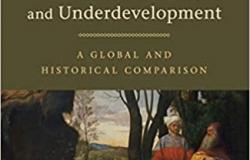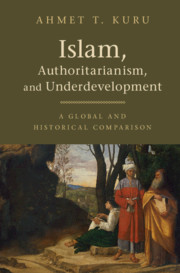Book Review - Islam, Authoritarianism, and Underdevelopment: A Global and Historical Comparison

Islam, Authoritarianism, and Underdevelopment: A Global and Historical Comparison by Ahmet T. Kuru. Cambridge, Cambridge University Press, 2019. 316 pp., £74.99 hardcover 978-1-108-40909-3, £26.99 paperback 978-1-108-40947-6, $28 e-book 978-1-108-32124-2
Growing up under the Islamic Republic, the world was simple; it was divided between black and white, good (Islam), and evil (taghut/idol). All our problems were caused by the West and western Colonization (estemaar), which is the main reason for the Muslim world's underdevelopment. Colonization was a simple and appealing answer; blaming others is always easier than accepting responsibility!
From this perspective, independence and returning to self (Islam) was the only remedy to our problem. "Islam is the solution" was a motto of all political Islamists pushing for Islamizing all aspects of human life. They have planned to create an Iranian Islamic utopia since the 1970s.
In Iran, the Islamists overthrew the Pahlavi monarchy and created an Islamic regime. However, they have not been able to solve the problems. Moreover, the clerics who were the guardians of Islam were more corrupt, repressive, and hypocritical than the monarchy's rulers. As a result, Islamism gradually lost its appeal in the decades following the revolution, after Iranian Islamists failed to fulfill their promises. The result was a rapid, bottom-up "secularization" of Iranian society. Like a growing number of disappointed Iranian youths, I began to see Islam as the main reason for our undeveloped society and authoritarian regime.
 Studying political science, I gradually realized that neither colonization nor Islam is the problem. Since the late 1990s, neo institutionalists developed a new approach, recognizing the prevalence of extractive institutions in the Islamic World compared to integrative institutions in the West. Integrative institutions, which are necessary for development and progress, didn't develop in the Islamic world. Despite the strength of the institutionalists' arguments, they cannot show how these institutions developed in the first place. Thus, institutionalism underestimates human agency.
Studying political science, I gradually realized that neither colonization nor Islam is the problem. Since the late 1990s, neo institutionalists developed a new approach, recognizing the prevalence of extractive institutions in the Islamic World compared to integrative institutions in the West. Integrative institutions, which are necessary for development and progress, didn't develop in the Islamic world. Despite the strength of the institutionalists' arguments, they cannot show how these institutions developed in the first place. Thus, institutionalism underestimates human agency.
The question of the Muslim world's backwardness is not new. But, since the 19th century, many Muslims and non-Muslim observers have asked, what went wrong? There are many answers, none of them satisfactory. Ahmet Kuru, professor of political science at San Diego University, tries to provide a new answer to these questions through his ambitious study "Islam, Authoritarianism, and Underdevelopment. A Global and Historical Comparison."
The book consists of two main sections, present and past. The first section focuses on the current circumstances of the socioeconomic and political situation of the Islamic world. Utilizing empirical methods and statistical data, Kuru comparatively studies the contemporary status of Muslim-majority countries (MMC) in terms of high levels of violence, the prevalence of authoritarianism, and low levels of socioeconomic development compared to world averages. As Kuru shows, MMCs are usually undeveloped, ruled by dictators, and witness a higher level of violence! Why?
Kuru initially reviews the prevailing answers to this question: primarily Islam and Colonization. As Kuru shows, while colonization has substantial impacts on MMC development, the Islamic world's decline started before western colonization began. Colonization benefitted from Muslim political, intellectual, and economic stagnation but was not the cause of MMC's backwardness.
However, Islam itself can't explain our backwardness. Kuru argues that this answer is essentialist and historically wrong; Islam is not one unified thing. There are several interpretations of Islam. For example, Ghazali and Ibn Taymiyya's Islam is fundamentally different from Avicenna and al Khwarizmi's. Also, Kuru shows that the Islamic world was more progressive than the West between the 8thand 11th centuries.
Criticizing the arguments, in the second part of the book (the past), Kuru puts forth his theory behind the lack of development and prevalence of dictatorships in MMC. The state-clergy alliance, which developed in the 11th century, is the crucial reason behind the Islamic world's stagnation, he claims.
From the 7th to the 11th century (the golden age of Islam), the Islamic world experienced a period of rapid progress. The engine behind the blooming Islamic civilization, Kuru argues, was the relative independence of scholars and the expansion of merchants. As a result, Islamic Ulema, either involved in a trade or supported by merchants, remained functionally independent from the State.
The situation changed gradually in the 11th century, first with the emergence of Shia rulers, who were perceived as a threat to the Sunni caliphs. To neutralize this threat, the Abbasid caliphs started a new wave of sunnization, who declared war against heterodox groups, including Shia, rationalist theologians (Mutazilis), and Muslim philosophers, declaring them apostates deserving of death.
Moreover, the Sunni caliph relied more and more on Sunni Turkish soldiers, migrating from central Asia, as a counter to Shia rulers. Under Turkish rulers, like the Seljuks, Iqta practice, a form of tax farming, expanded. In the Iqta system, a regional ruler received the right to collect taxes from an area in exchange for his service, usually military service.
Empowered by Iqta, Sunni military rulers created a series of madrasas, the Nizamiyyas, where a group of stated sponsored Sunni Ulema were trained to protect and legitimize the Sunni caliph against other Islamic interpretations and denominations. The Ulema and military rulers developed a reciprocal relationship in which Ulema legitimized the State, and rulers provided financial support for the Ulema. This alliance marginalized the independent scholars and merchants, who were the foundation of socioeconomic development.
This model (the Ulema–state alliance) was strengthened because of external attacks on the Islamic world (the Crusader and Mongol invasions) and later spread to other Sunni states. The Mongol empire adopted this model, and the three Islamic gunpowder empires that emerged between the 16th-18th centuries (Ottoman, Safavid, and India's Mughal) incorporated it as well. That's why, from the 18th to 19th century, Ulema usually opposed any development and change to continue their monopoly over Islam.
In comparison, Western Europe experienced a different transformation: a separation of the church and state authorities and an expansion of universities led to the emergence of the intellectual class. Moreover, the growth of the merchant class continued to work as the engine of European economic advances.
In Kuru's approach, the dynamic between ideas and material factors shaped the transformation of history. From one side, he explains the importance of the iqta system and modern oil rentierism on developing the class alliance between Ulema and the State. On the other hand, he also emphasizes the role of ideas in the transformation of society, for example, by analyzing Imam Ghazali and Ibn Taymiyya's argument for the dominance of Hanafi Islam and how it shaped the ulema-state alliance. Unlike many studies on this topic, which ignore the role of the State, as a political scientist, Kuru’s strength is shedding light on the State's role in the development and stagnation of Muslim majority countries.
Through a comparative study between western and Islamic society, Kuru places his analysis in a broader scope. However, his comprehensive coverage can also be seen as the book's weakness, as he summarizes and simplifies some concepts and does not cover all essential Islamic scholars. Despite Kuru's excellent job in providing detailed evidence of the Ulema–state coalition in the Islamic world since the 11th century, more analysis is needed to show why this alliance persists through the modern era, despite many political changes.
Islam, Authoritarianism, and Underdevelopment: A Global and Historical Comparison is an objective study that disarms postcolonial scholars, Islamists, and Islamophobes in their bizarre analyses of the backwardness of the Islamic world. A skillful rendering, the book can be adopted in undergrad and graduate classes for a broad range of humanities and social science majors. In the end, the book is a must-read for all Muslims and people who are interested in religion and politics in general and development in particular. I cannot recommend it enough!
Saeid Golkar is an Assistant Professor in the Department of Political Science and Public Service at the University of Tennessee at Chattanooga. Concurrently, he is a non-resident Senior Fellow on Middle East Policy at the Chicago Council on Global Affairs (CCGA), and The Tony Blair Institute for Global Change in the UK.


